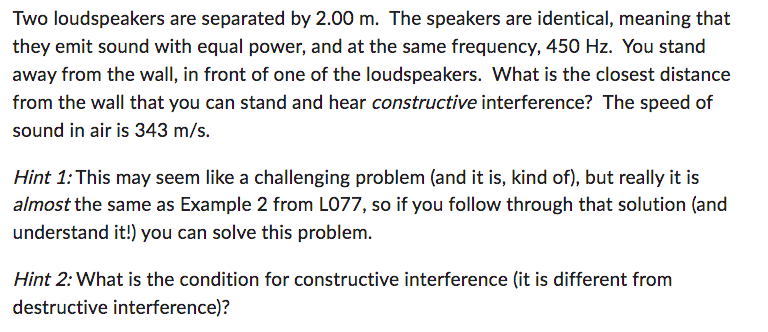Two loudspeakers are separated by 2.00 m. The speakers are identical, meaning that they emit sound with equal power, and at the same frequency, 450 Hz. You stand away from the wall, in front of one of the loudspeakers. What is the closest distance from the wall that you can stand and hear constructive interference? The speed of sound in air is 343 m/s. Hint 1: This may seem like a challenging problem (and it is, kind of), but really it is almost the same as Example 2 from L077, so if you follow through that solution (and understand it!) you can solve this problem. Hint 2: What is the condition for constructive interference (it is different from destructive interference)?
Two loudspeakers are separated by 2.00 m. The speakers are identical, meaning that they emit sound with equal power, and at the same frequency, 450 Hz. You stand away from the wall, in front of one of the loudspeakers. What is the closest distance from the wall that you can stand and hear constructive interference? The speed of sound in air is 343 m/s. Hint 1: This may seem like a challenging problem (and it is, kind of), but really it is almost the same as Example 2 from L077, so if you follow through that solution (and understand it!) you can solve this problem. Hint 2: What is the condition for constructive interference (it is different from destructive interference)?
College Physics
11th Edition
ISBN:9781305952300
Author:Raymond A. Serway, Chris Vuille
Publisher:Raymond A. Serway, Chris Vuille
Chapter1: Units, Trigonometry. And Vectors
Section: Chapter Questions
Problem 1CQ: Estimate the order of magnitude of the length, in meters, of each of the following; (a) a mouse, (b)...
Related questions
Concept explainers
Interference of sound
Seiche
A seiche is an oscillating standing wave in a body of water. The term seiche pronounced saysh) can be understood by the sloshing of water back and forth in a swimming pool. The same phenomenon happens on a much larger scale in vast bodies of water including bays and lakes. A seizure can happen in any enclosed or semi-enclosed body of water.
Question

Transcribed Image Text:Two loudspeakers are separated by 2.00 m. The speakers are identical, meaning that
they emit sound with equal power, and at the same frequency, 450 Hz. You stand
away from the wall, in front of one of the loudspeakers. What is the closest distance
from the wall that you can stand and hear constructive interference? The speed of
sound in air is 343 m/s.
Hint 1: This may seem like a challenging problem (and it is, kind of), but really it is
almost the same as Example 2 from L077, so if you follow through that solution (and
understand it!) you can solve this problem.
Hint 2: What is the condition for constructive interference (it is different from
destructive interference)?
Expert Solution
This question has been solved!
Explore an expertly crafted, step-by-step solution for a thorough understanding of key concepts.
Step by step
Solved in 2 steps with 2 images

Knowledge Booster
Learn more about
Need a deep-dive on the concept behind this application? Look no further. Learn more about this topic, physics and related others by exploring similar questions and additional content below.Recommended textbooks for you

College Physics
Physics
ISBN:
9781305952300
Author:
Raymond A. Serway, Chris Vuille
Publisher:
Cengage Learning

University Physics (14th Edition)
Physics
ISBN:
9780133969290
Author:
Hugh D. Young, Roger A. Freedman
Publisher:
PEARSON

Introduction To Quantum Mechanics
Physics
ISBN:
9781107189638
Author:
Griffiths, David J., Schroeter, Darrell F.
Publisher:
Cambridge University Press

College Physics
Physics
ISBN:
9781305952300
Author:
Raymond A. Serway, Chris Vuille
Publisher:
Cengage Learning

University Physics (14th Edition)
Physics
ISBN:
9780133969290
Author:
Hugh D. Young, Roger A. Freedman
Publisher:
PEARSON

Introduction To Quantum Mechanics
Physics
ISBN:
9781107189638
Author:
Griffiths, David J., Schroeter, Darrell F.
Publisher:
Cambridge University Press

Physics for Scientists and Engineers
Physics
ISBN:
9781337553278
Author:
Raymond A. Serway, John W. Jewett
Publisher:
Cengage Learning

Lecture- Tutorials for Introductory Astronomy
Physics
ISBN:
9780321820464
Author:
Edward E. Prather, Tim P. Slater, Jeff P. Adams, Gina Brissenden
Publisher:
Addison-Wesley

College Physics: A Strategic Approach (4th Editio…
Physics
ISBN:
9780134609034
Author:
Randall D. Knight (Professor Emeritus), Brian Jones, Stuart Field
Publisher:
PEARSON